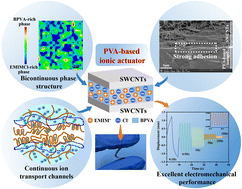Construction of poly(vinyl alcohol)-based ionogels with continuous ion transport channels enables high performance ionic soft actuators†
Abstract
Although electrode materials have been tremendously researched, there are few reports on the design of ordinary and biofriendly polymer electrolytes for developing high-performance actuators. Herein, in view of poly(vinyl alcohol) (PVA) with excellent biocompatibility and low cost, a superior ionic soft actuator based on a PVA-based ionogel electrolyte was successfully developed by constructing continuous ion transport channels. By the introduction of benzoic acid groups into a PVA chain (BPVA), strong hydrogen bonding enriched regions (BPVA-rich phase) formed via their spontaneous self-aggregations. Meanwhile, 1-ethyl-3-methylimidazolium chloride (EMIMCl) had good compatibility with hydroxyl groups on the PVA chain via weak hydrogen bonding to form an EMIMCl-rich phase, resulting in the formation of a bicontinuous phase structure in the ionogel system. Specifically, due to stronger dipole characteristics of the benzoic acid group compared with the hydroxyl group on the PVA chain, the ion–dipole interactions between –C![[double bond, length as m-dash]](https://www.rsc.org/images/entities/char_e001.gif) O in benzoic acid groups and EMIM+ formed at the phase interface, which facilitated formation and migration of mobile ions, forming continuous ion transport channels. Besides, strong adhesion between the SWCNT electrode and PVA-based ionogels effectively reduced the interfacial transport resistance of mobile ions. The resulting PVA-based ionogels exhibited exceptional electrical properties with an ionic conductivity of 0.257 mS cm−1 and excellent mechanical stretchability (∼1600% strain). The obtained PVA-based ionic actuator displayed quasi-rectangular CV curves with improved areal capacitances, while the competitive performance of the actuator with a large bending strain of 0.52% at 0.1 Hz, a broad-band frequency response of 0.1–25 Hz, and excellent cycling stability with a bending displacement retention of almost 89% after 3100 cycles in air was exhibited. This work opens up new avenues for developing ionic actuator electrolytes based on biofriendly polymer electrolytes with great potential for artificial intelligence devices.
O in benzoic acid groups and EMIM+ formed at the phase interface, which facilitated formation and migration of mobile ions, forming continuous ion transport channels. Besides, strong adhesion between the SWCNT electrode and PVA-based ionogels effectively reduced the interfacial transport resistance of mobile ions. The resulting PVA-based ionogels exhibited exceptional electrical properties with an ionic conductivity of 0.257 mS cm−1 and excellent mechanical stretchability (∼1600% strain). The obtained PVA-based ionic actuator displayed quasi-rectangular CV curves with improved areal capacitances, while the competitive performance of the actuator with a large bending strain of 0.52% at 0.1 Hz, a broad-band frequency response of 0.1–25 Hz, and excellent cycling stability with a bending displacement retention of almost 89% after 3100 cycles in air was exhibited. This work opens up new avenues for developing ionic actuator electrolytes based on biofriendly polymer electrolytes with great potential for artificial intelligence devices.



 Please wait while we load your content...
Please wait while we load your content...